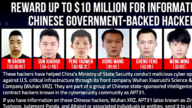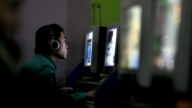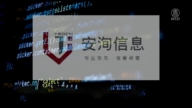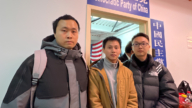【新唐人2014年05月22日訊】自2009年起,中國6億網民被封鎖在境外社交媒體「推特(twitter)」、「臉書(facebook)」之外。而中國各大官方媒體和地方政府部門,近來卻紛紛登陸這些網站,開設賬號。大陸民眾提出質疑,對中共當局實行這種「內外有別」的政策表示不滿,認為「這種思維方式是對中國民眾的公然歧視」。
長期以來,眾多西方主流媒體網站在中國遭到封鎖,中國6億網民需要運用「翻牆」軟件技術才能瀏覽境外網站。而在世界網民中廣泛使用的社交媒體平臺,如「推特」、「臉書」等,也被中共耗費巨資經營的網絡防火牆(great firewall)屏蔽在外。
近來,中共官方的《新華社》、《人民日報》和廣播媒體《央視》都有「推特」賬號。同樣的,各大城市接待部門和各省當局也開設了「推特」賬號。《美國之音》發現﹕「山東、黑龍江、四川、陝西等省旅遊管理部門」在「推特」和「臉書」上都設有官方頁面。
陝西省政府早在今年2月前,已在「臉書」、「YouTube(俗稱油管)」和「推特」上註冊,並打出旅遊廣告,還在中國的「微博」上宣佈相關網路位址。
當時,廣州《南方都市報》在報導中,引述陝西省旅遊局一位工作人員的話說,為了對境外推廣當地旅遊,陝西省旅遊局已在這些國際知名社交網站上建立了專頁。
不過,報導指出,多位網友在評論中抱怨,相關鏈接打不開。而陝西省旅遊局工作人員證實,在中國國內確實無法訪問這些主頁,因為「不提倡國內遊客訪問」。
《法新社》報導指出,中國共產黨當局禁止本國民眾上「臉書」、「推特」和「youtube」等全球性社交媒體平臺,但輪到自我促銷時,當局自己也變成忠實用戶了。
一名大陸網民在評論中寫道,「這種思維方式是對中國民眾的公然歧視。」
《權利運動》網站負責人胡軍﹕「蹲在大牆裡面這些13億老百姓是不可以了解外面的世界的,因為他們都是被中共關押的囚犯。像我現在網被斷了,當你想了解真相的時候,你的網已經被斷了,而且很可能被送監獄,因為我(被)斷網的原因就是(對)新疆的事情發表了一些評論,它要維護這個體制的話,它就要把整個的意識形態這一塊,全部要控制起來。而且從經濟上、文化上、政治上剝奪公民的權益。」
在中國「六四事件」二十週年的2009年,中國有關「六四」的網路行動,包括網站及討論區,被當局以「網路維護」的名義關閉。2009年底,中共當局再以「打擊色情網站」為名,關閉了國內的10萬個網站。
據了解,至今完全被中共屏蔽的境外網站,除《新唐人電視臺》、《美國之音》等媒體外,還包括有關政治、政黨和不同政見的網站。
大陸作家荊楚﹕「一以貫之的,它(中共政權)是一個特權人制度,從毛澤東建立蘇俄的魁儡政權的那一天起,老百姓只聽共產黨所說的那些假、大、空。而對於高級官員,它希望他們了解事件的真實情況。各種各樣資訊的享用,它也分級別的。它不能讓老百姓知道真相,一旦老百姓知道了事實的真相,共產黨所欺騙、洗腦的東西,就無效了。」
一些大陸網友為繞過「防火長城」,突破網路封鎖,使用了VPN虛擬專用網絡,或破網軟件。
荊楚﹕「應該這種控制越來越變得不是那麼有效了,雖然可以大致矇蔽很多老百姓,但是像自由門、無界瀏覽這些翻牆軟件,有越來越多的人學會使用了,就可以看到更多真實的訊息,它的限制就不是那麼有效了。」
胡軍﹕「我們更多的人應該發出自己的聲音去吶喊,去要求我們自身的權益,把中共這個獨裁的體制解體了,讓我們中國人生活在一個自由、一個沒有恐懼的生活環境裡頭。我們只有消滅中共,只有讓中共這個邪惡的體制解體,才會有希望的未來。」
同樣被中共當局屏蔽的美國《明慧》網站,20號刊登一篇文章,作者說,他在東北城市開的餐館內架設衛星接收器,收看《新唐人》節目。而「新唐人每一個真實、客觀、公正、敢言的節目,都在不斷的觸及和撼動著百姓的心靈。」
採訪/朱智善 編輯/周平 後製/陳建銘
Chinese Communist Party Uses Facebook,But Not The Citizens.
Since 2009, 600 million Chinese netizens have been forbidden
from using Twitter and Facebook.
However, recently, China’s major state-run media and local
regimes started registering accounts on Twitter and Facebook.
People questioned the regime and were unhappy
about its unequal policy.
People believe that the Chinese Communist Party (CCP)
openly discriminates against its own citizens.
For a long time, the Western mainstream media websites
were blocked from being viewed in China.
In order to view overseas websites, 600 million Chinese
netizens have to use anti-blockage software.
However, the most widely used social media networks, such
as Twitter and Facebook, were blocked by the CCP’s great
firewall which costs a huge amount of money to operate.
China’s state-run media Xinhua News Agency, People’s
Daily, and Central Television, all have Twitter accounts.
The major cities and provincial regimes also opened
Twitter accounts.
Voice of America (VOA) found that tourist management
departments in Shandong, Heilongjiang, Sichuan, Shananxi
and other provinces have official Twitter pages.
By February, the local Shananxi CCP registered accounts
at Facebook, YouTube and Twitter.
They put tourist advertisement on its pages.
They also announced links of their social network pages
in China’s Weibo.
Guangzhou’s Southern Metropolis Daily quoted staff from
Shananxi Travel Bureau that to promote local tourist business,
they set up pages in these international social media networks.
The report says that many netizens gave feedback that
they couldn’t open the related links.
Staff of Shananxi Tourist Bureau proved that inside China
they couldn’t open these home pages, because it is not about
letting Mainland citizens visit the links.
AFP reported that the CCP banned its own citizens from
using Facebook, Twitter and Youtube.
But when the need came to promote itself, it became a loyal
user of these social media networks.
A Chinese netizen commented: “The CCP openly
discriminates against its own citizens."
Hu Jun, founder of hrcchina.org: “The 1.3 billion Chinese
people are locked inside China, and not allowed to know
the outside world.
Because they are like prisoners, they have been
locked up by the CCP.
When I want to find out the truth, my internet was cut off.
It was possible I would be sent to prison.
The reason for cutting off my internet, was because I
published my comments over the Xinjiang incident.
If the CCP controls the system, it will control ideology. It
deprives citizens of economic, cultural and political rights."
In 2009, on the 20th anniversary of the June 4 incident,
all related online campaigns, including websites and forums
were closed on the excuse of “server maintenance".
At end of 2009, the regime closed 100,000 websites
using the excuse of fighting porn websites.
Sources say that the CCP blockaded overseas websites
includes NTD Television, VOA and other media.
It also shuts access to websites with different stances in
politics and government etc.
China-based writer Jing Chu: “The CCP is a one-man rule,
and is a privilege system.
From the day Mao Zedong established a Russian style regime,
Chinese people can only hear the CCP’s lies, fake big and
empty talks.
As for senior officials, the CCP hopes they know more real
information.
Different status levels of officials can know different
levels of information.
However, the CCP cannot let civilians know the truth.
Once people know the truth, the CCP’s brainwashing and
deception would not work."
Some Chinese netizens use VPN or anti-blockage software
to avoid the CCP’s firewall.
Jing Chu: “The CCP’s control becomes less and less effective.
Although it still can deceive some people, many more citizens
started learning how to use Freegate and UltraSurf.
They can search more true information, the CCP is loosing
control and is becoming somewhat ineffective."
Hu Jun: “More of us should speak out to request our rights.
By abolishing the CCP’s dictatorship, Chinese people can live
in an environment with freedom and no fear.
Only by eliminating the CCP, and letting the evil system
collapse, can that future be applicable."
The US-based Minghui website was also censored
by the CCP.
Minghui published an article on May 20. The author said he
set up a satellite receiver in his restaurant in a Northeast city
to watch NTD television.
“NTD provides truthful, objective, fair and uncensored
programs,it is constantly in touch with people’s minds."
Interview/Zhu Zhishan Edit/Zhou Ping Post-Production/Chen Jianming




























